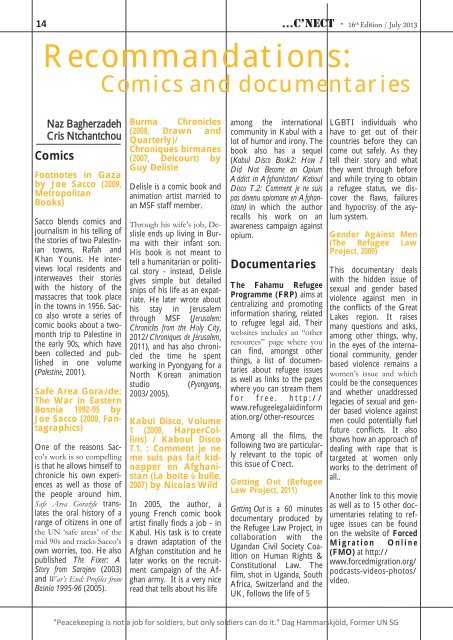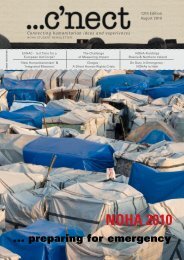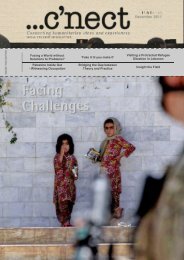Voices of the Voiceless - NOHA Alumni Community
Voices of the Voiceless - NOHA Alumni Community
Voices of the Voiceless - NOHA Alumni Community
You also want an ePaper? Increase the reach of your titles
YUMPU automatically turns print PDFs into web optimized ePapers that Google loves.
14 ...C’neCt - 16 th Edition / July 2013<br />
Recommandations:<br />
Comics and documentaries<br />
Naz Bagherzadeh<br />
Cris Ntchantchou<br />
Comics<br />
Footnotes in Gaza<br />
by Joe Sacco (2009,<br />
Metropolitan<br />
Books)<br />
Sacco blends comics and<br />
journalism in his telling <strong>of</strong><br />
<strong>the</strong> stories <strong>of</strong> two Palestinian<br />
towns, Rafah and<br />
Khan Younis. He interviews<br />
local residents and<br />
interweaves <strong>the</strong>ir stories<br />
with <strong>the</strong> history <strong>of</strong> <strong>the</strong><br />
massacres that took place<br />
in <strong>the</strong> towns in 1956. Sacco<br />
also wrote a series <strong>of</strong><br />
comic books about a twomonth<br />
trip to Palestine in<br />
<strong>the</strong> early 90s, which have<br />
been collected and published<br />
in one volume<br />
(Palestine, 2001).<br />
Safe Area Goražde:<br />
The War in Eastern<br />
Bosnia 1992-95 by<br />
Joe Sacco (2000, Fantagraphics)<br />
One <strong>of</strong> <strong>the</strong> reasons Sacco’s<br />
work is so compelling<br />
is that he allows himself to<br />
chronicle his own experiences<br />
as well as those <strong>of</strong><br />
<strong>the</strong> people around him.<br />
Safe Area Goražde translates<br />
<strong>the</strong> oral history <strong>of</strong> a<br />
range <strong>of</strong> citizens in one <strong>of</strong><br />
<strong>the</strong> UN ‘safe areas’ <strong>of</strong> <strong>the</strong><br />
mid 90s and tracks Sacco’s<br />
own worries, too. He also<br />
published The Fixer: A<br />
Story from Sarajevo (2003)<br />
and War’s End: Pr<strong>of</strong>iles from<br />
Bosnia 1995-96 (2005).<br />
Burma Chronicles<br />
(2008, Drawn and<br />
Quarterly)/<br />
Chroniques birmanes<br />
(2007, Delcourt) by<br />
Guy Delisle<br />
Delisle is a comic book and<br />
animation artist married to<br />
an MSF staff member.<br />
Through his wife’s job, Deslisle<br />
ends up living in Burma<br />
with <strong>the</strong>ir infant son.<br />
His book is not meant to<br />
tell a humanitarian or political<br />
story - instead, Delisle<br />
gives simple but detailed<br />
snips <strong>of</strong> his life as an expatriate.<br />
He later wrote about<br />
his stay in Jerusalem<br />
through MSF (Jerusalem:<br />
Chronicles from <strong>the</strong> Holy City,<br />
2012/Chroniques de Jérusalem,<br />
2011), and has also chronicled<br />
<strong>the</strong> time he spent<br />
working in Pyongyang for a<br />
North Korean animation<br />
studio (Pyongyang,<br />
2003/2005).<br />
Kabul Disco, Volume<br />
1 (2009, HarperCollins)<br />
/ Kaboul Disco<br />
T.1. : Comment je ne<br />
me suis pas fait kidnapper<br />
en Afghanistan<br />
(La boîte à bulle,<br />
2007) by Nicolas Wild<br />
In 2005, <strong>the</strong> author, a<br />
young French comic book<br />
artist finally finds a job - in<br />
Kabul. His task is to create<br />
a drawn adaptation <strong>of</strong> <strong>the</strong><br />
Afghan constitution and he<br />
later works on <strong>the</strong> recruitment<br />
campaign <strong>of</strong> <strong>the</strong> Afghan<br />
army. It is a very nice<br />
read that tells about his life<br />
among <strong>the</strong> international<br />
community in Kabul with a<br />
lot <strong>of</strong> humor and irony. The<br />
book also has a sequel<br />
(Kabul Disco Book2: How I<br />
Did Not Become an Opium<br />
Addict in Afghanistan/ Kaboul<br />
Disco T.2: Comment je ne suis<br />
pas devenu opiomane en Afghanistan)<br />
in which <strong>the</strong> author<br />
recalls his work on an<br />
awareness campaign against<br />
opium.<br />
Documentaries<br />
The Fahamu Refugee<br />
Programme (FRP) aims at<br />
centralizing and promoting<br />
information sharing, related<br />
to refugee legal aid. Their<br />
websites includes an “o<strong>the</strong>r<br />
resources” page where you<br />
can find, amongst o<strong>the</strong>r<br />
things, a list <strong>of</strong> documentaries<br />
about refugee issues<br />
as well as links to <strong>the</strong> pages<br />
where you can stream <strong>the</strong>m<br />
f o r f r e e . h t t p : / /<br />
www.refugeelegalaidinform<br />
ation.org/o<strong>the</strong>r-resources<br />
Among all <strong>the</strong> films, <strong>the</strong><br />
following two are particularly<br />
relevant to <strong>the</strong> topic <strong>of</strong><br />
this issue <strong>of</strong> C'nect.<br />
Getting Out (Refugee<br />
Law Project, 2011)<br />
Getting Out is a 60 minutes<br />
documentary produced by<br />
<strong>the</strong> Refugee Law Project, in<br />
collaboration with <strong>the</strong><br />
Ugandan Civil Society Coalition<br />
on Human Rights &<br />
Constitutional Law. The<br />
film, shot in Uganda, South<br />
Africa, Switzerland and <strong>the</strong><br />
UK, follows <strong>the</strong> life <strong>of</strong> 5<br />
LGBTI individuals who<br />
have to get out <strong>of</strong> <strong>the</strong>ir<br />
countries before <strong>the</strong>y can<br />
come out safely. As <strong>the</strong>y<br />
tell <strong>the</strong>ir story and what<br />
<strong>the</strong>y went through before<br />
and while trying to obtain<br />
a refugee status, we discover<br />
<strong>the</strong> flaws, failures<br />
and hypocrisy <strong>of</strong> <strong>the</strong> asylum<br />
system.<br />
Gender Against Men<br />
(The Refugee Law<br />
Project, 2009)<br />
This documentary deals<br />
with <strong>the</strong> hidden issue <strong>of</strong><br />
sexual and gender based<br />
violence against men in<br />
<strong>the</strong> conflicts <strong>of</strong> <strong>the</strong> Great<br />
Lakes region. It raises<br />
many questions and asks,<br />
among o<strong>the</strong>r things, why,<br />
in <strong>the</strong> eyes <strong>of</strong> <strong>the</strong> international<br />
community, gender<br />
based violence remains a<br />
women’s issue and which<br />
could be <strong>the</strong> consequences<br />
and whe<strong>the</strong>r unaddressed<br />
legacies <strong>of</strong> sexual and gender<br />
based violence against<br />
men could potentially fuel<br />
future conflicts. It also<br />
shows how an approach <strong>of</strong><br />
dealing with rape that is<br />
targeted at women only<br />
works to <strong>the</strong> detriment <strong>of</strong><br />
all..<br />
Ano<strong>the</strong>r link to this movie<br />
as well as to 15 o<strong>the</strong>r documentaries<br />
relating to refugee<br />
issues can be found<br />
on <strong>the</strong> website <strong>of</strong> Forced<br />
Migration O n l i n e<br />
(FMO) at http://<br />
www.forcedmigration.org/<br />
podcasts-videos-photos/<br />
video.<br />
"Peacekeeping is not a job for soldiers, but only soldiers can do it." Dag Hammarskjöld, Former UN SG




